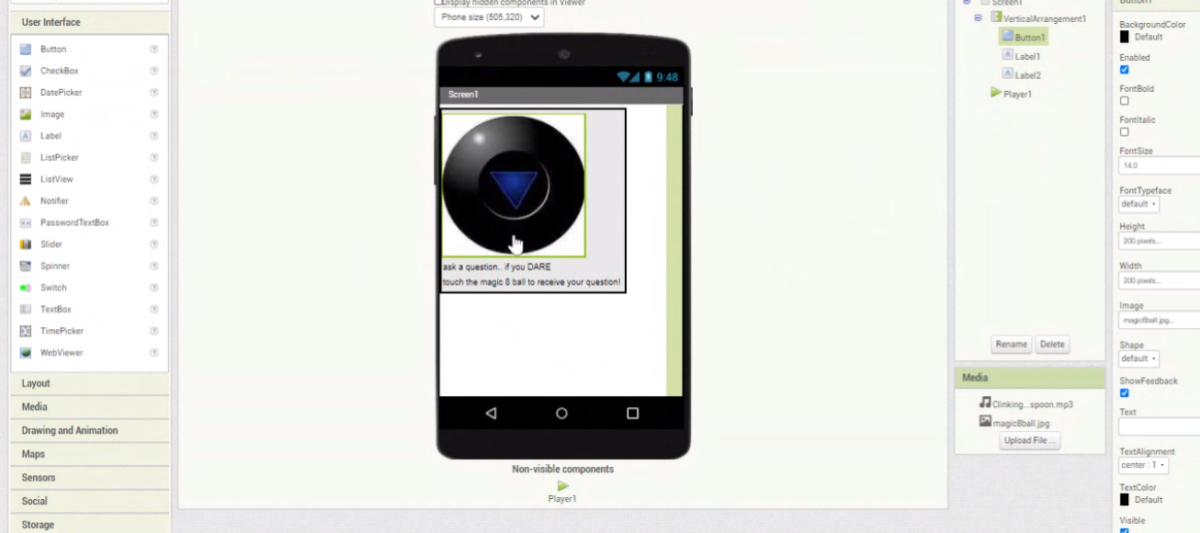In line with citywide efforts to get students from underrepresented backgrounds into STEM, for a few weeks this summer, Philly middle schoolers learned algebra readiness and coding skills via Community College of Philadelphia’s summer STEM Academy.
Rising seventh and eighth graders participated in two sessions of a virtual learning academy that combined live instruction with prerecorded sessions.
From July 20 through 30, students participated in “Minecraft World.” The session centered around popular video game Minecraft which was used as a way to introduce concepts related to math and coding. The second session from Aug. 10 through 20 was called “#AwesomeApps” and saw students coding ideas into mobile apps via MIT App Inventor.
After creating the apps, students pitched them in a showcase on Thursday. Here’s a look at what a handful came up with:
Shaking things up
Malika S.’s mobile app is a Magic Eight-Ball simulator. Malika coded her app so that by shaking your phone in the way you would a traditional Magic Eight-Ball, one of several questions will appear in a random order.
Naming that state
Arianna R. coded an app that allows users to answer trivia questions around state capitals. In her demonstration, Arianna explained that answering a question about the state capital of Texas could allow the user to input Austin, the correct answer. Users are able to enter as many answers as they want since there is no grading involved, making it an effective study tool: “I could use this for social studies during the school year,” she said.

Hitting the links by phone
Stephanie J.’s mini golf app is perfect for people who want to hit golf balls but find themselves limited by the pandemic. In her app, players can use their fingers to hit golf balls. Stephanie coded each possible direction for the golf ball to move and coded options for colors to change when balls go in the hole.
Creating with a magic touch
For Patricia N.’s second app, she coded a Magic Doodle application that allows users to create their own drawings. “[I coded it] so that the warm colors on are on the left and cool colors are on the right,” she said. By tapping a certain color, users are able to draw on the app’s empty space in a method akin to Microsoft Paint.
Answering 20 of life’s questions
Patricia N. also coded a Magic Eight-Ball that responds to users shaking their phones. For her version, users can select one of 20 questions and shake to get answers to their fortunes.
###
The STEM academy was part of a larger initiative from the community college’s Division of Access and Community Engagement and was made possible with help from New York Life’s Aim High grant. Twenty students were given access to each session at a price of $25 per student.
Besides teaching coding skills, the academy was a deep dive in into Algebra 1 readiness: Math instructor and academic advisor David Elkin was tasked with making complex math concepts like formal logic more digestible for his summer middle school students. Using Minecraft and coding exercises helped students apply their new ideas in ways with clear results.
“With Minecraft they want to play a game and see the levels,” he said. “Math allowed them to access more interesting kinds of challenges. With the app creator, when we did logic, we wanted to create a strong setup of what an argument is. With coding, they could understand logic immediately. They asked what things did and why they happened.”
Academic advisor Juliet Popiel said she was inspired by the students’ high energy and willingness to explore new concepts. During moments like a demonstration day with office hours, students helped each other work through concepts and to solve problems related to their projects.
“There were moments when we had to go through code slowly, but in general they had a motivation to make these apps their own,” she said. “The kids were always asking questions about their apps. By using the MIT App Inventor, you can get results quickly. They were able to build a few lines of code and see results.”
With the academy’s support, students will eventually make their apps available for purchase via the Google Play store.







